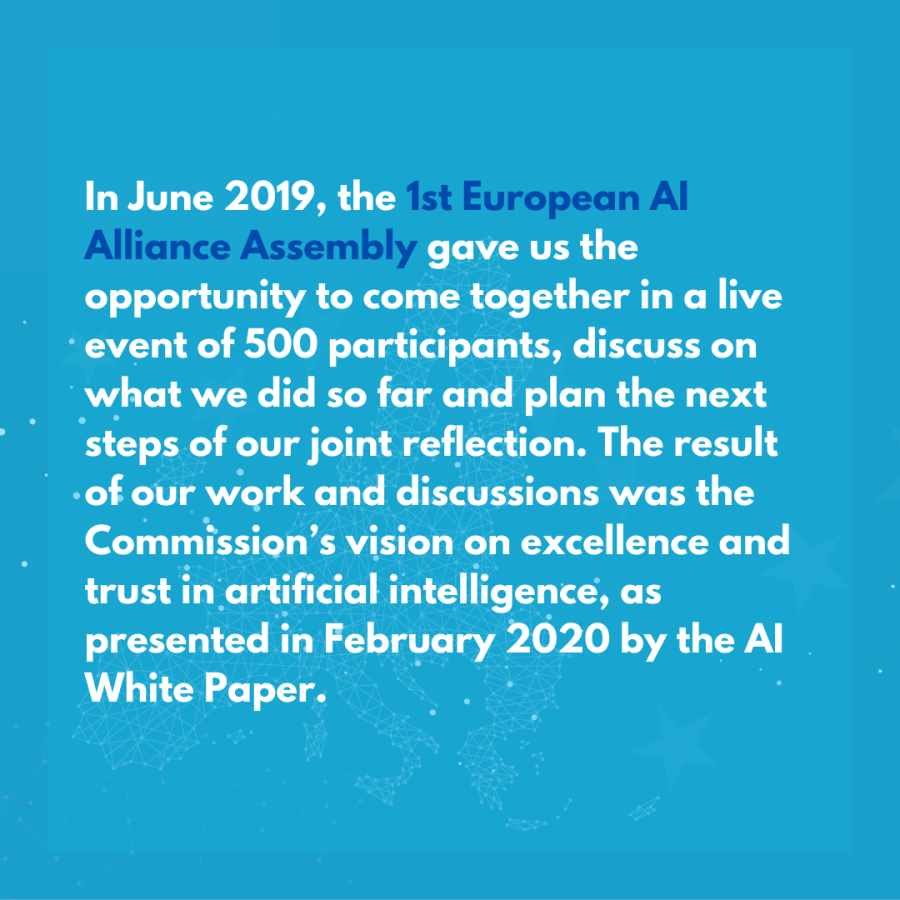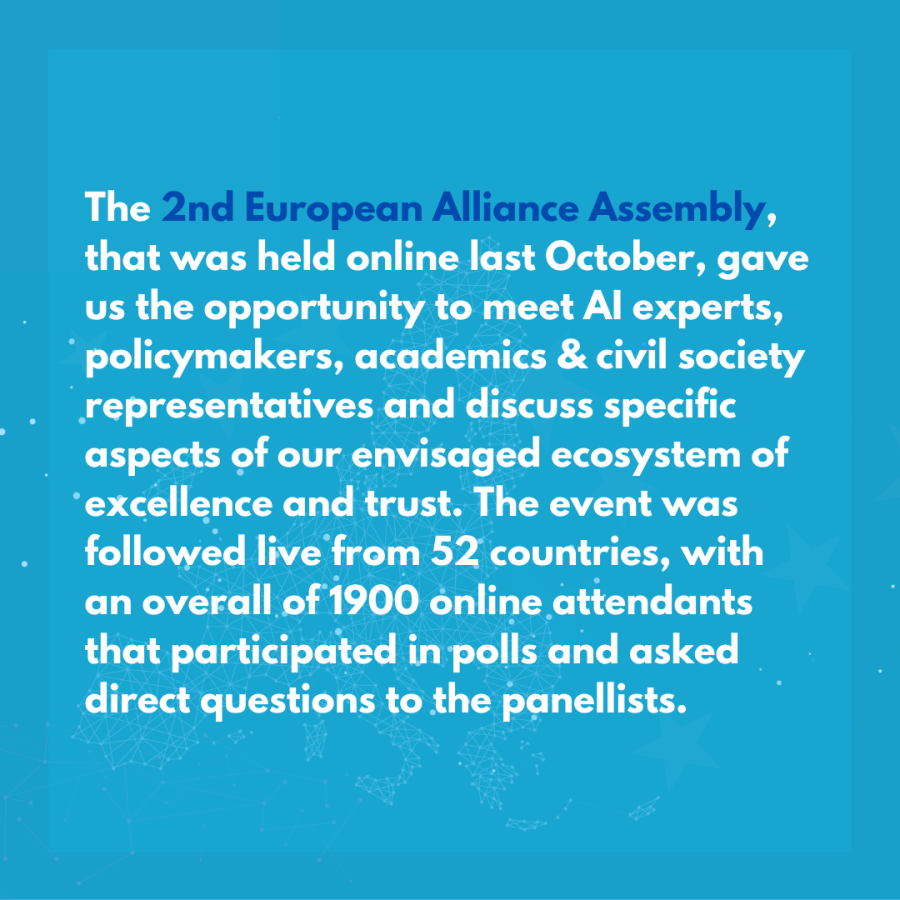Dear members of the European AI Alliance,
As we reach towards the end of a year disruptive to our daily lives and working patterns, please allow me to share a few thoughts on artificial intelligence (AI) and the reasons why we must keep working together to build excellence and trust.
We have always considered technology as a disruptor of our economies and societies with AI being often associated to social, ethical and legal concerns. However, as we reach the end of a turbulent year, it is clear that technology has been one of the few stabilising forces. Indeed, we found that many of our problems had technological solutions. AI was one such solution, and the uptake of AI grew rapidly both in research and the industrial sector.
At the AI Alliance, we have worked since 2018 to prompt European citizens and business in making the best out of this technology while minimising the potential risks of its use. Along with the support of AI research, we aimed to democratise the policymaking process on AI and to build a common approach. With a legislative proposal coming up next year, we need to keep on working together to make AI comprehensive and trustworthy for all and bring Europe at the forefront of this technology.
It is my pleasure to share with you:
- Asummary report from the public consultationthat confronted our approach presented on a White Paper with the views of citizens and stakeholders;
- A summary report from the 2nd European AI Alliance Assembly, that brought this approach forward and has now become a point of reference in international policymaking for AI.
Both the White Paper on AI and the European AI Alliance Assembly are the products of our joint policy reflection initiated in this group. In the following paragraphs, you will find the main milestones of such reflection, starting with the launch of theEuropean AI Strategy in 2018.
Trustworthy AI: Our joint policy reflection
Two and a half years ago, we launched the AI Alliance with the ambition to create a forum where the future of AI in Europe could be discussed. Your warm response to our invitation, followed by an unprecedented flow of discussions, shared materials and replies in consultations launched by both our High-Level Expert Group on AI (AI HLEG) and the Commission, exceeded such ambition and created the largest and most influential online community for policy making in the field of AI.
I can only mention some of the main milestones of our joint policy reflection:
Consultation on the draft Ethics Guidelines for Trustworthy AI
Over 500 detailed comments for each of the chapters of the AI HLEG’s Guidelines were provided through the AI Alliance. In adedicated Communication, the Commission encouraged all stakeholders to implement the seven key requirements listed in the Guidelines and engaged to promote their human-centric approach to the global stage. One year after, Trustworthy AI has not just become a term of international consensus but it is also guiding the current legislative proposal on AI;
Forum discussions with the AI HLEG on the impact of AI in specific socio-economic fields
These discussions oriented the AI HLEG sub-groups through the topics addressed in theirPolicy and Investment Recommendations for Trustworthy AI, a key policy document guiding the idea of European excellence in AI;
Piloting of the Assessment List for Trustworthy AI
Over 350 stakeholders tested the Assessment List suggested by the Ethics guidelines in their AI Applications or provided feedback through online surveys, in-depth interviews and best practices published on the AI Alliance. Such feedback, led tothe final assessment listand itsweb-based prototype - ALTAIthat aims to support AI developers that want to test the trustworthiness of their systems.
Thebest practicessection, of the AI Alliance, still welcomes the sharing of suggestions, experiences and questions coming up during the use of the assessment list.
Excellence and Trust on AI: Our way forward
This new vision on Excellence and Trusts in Artificial Intelligence, initiated a new round of exchanges with our AI community:
Public Consultation launched along with the White Paperon AI
Over 1215 contributions (including 400 position papers) were received through the online questionnaire and communication channels of the AI Alliance while a series of meetings and round tables with AI experts where organized to enrich this vision with all societal, economic and scientific viewpoints that concern the future ecosystem of AI development in Europe.
As you will see in the final report of the consultation, all the actions proposed to be coordinated at a member state level, were largely supported:
This is why we are currently in the process of updating ourcoordinated plan with the EU member states. The updated document will be presented during the first quarter of 2021.
From the legislative point of view, fundamental rights and security are the main concerns revealed by the consultation. The majority of respondents sees the need of a new legislation or at least the enforcement of existing rules with new ones. On the other hand, there is a clear need voiced by the European industry on these rules to be balanced and innovation friendly. European AI should strike this balance with a trustworthy, sustainable and future proof legislation and this is what we are working on.
Relaunching the discussion
Same as the updated coordinated plan, our legislative proposal will come in the first quarter of 2021. In the meantime we would like to prepare our citizens, AI community and other stakeholders to best understand these upcoming documents, have an informed and critical viewpoint on them and be well prepared for the new social, legal and economic processes that they will entail. To do that, we need again the input of the European AI Alliance.
In the summary report of our second Assembly, you will find all the key points of the discussions while therecordings from the event are already online on the events webpage. We invite you to go through the document and watch again the videos according to your topics of interest. From our side, we will keep on providing the forum of the AI Alliance, as a meeting point for further community exchange and reflection.
Moreover, we have planned a series of blog-posts where experts will aim to discuss with the community specific concepts such as "AI transparency" or "AI explainability" as well as the methods that these concepts could better be mainstreamed to everyday discussions about AI.
At the European Commission, we look forward to start together with you this new chapter of the AI Alliance. While we prepare for the presentation of a legal text and coordinated plan on AI by early next year, we want to already prepare for our next steps together.
What are the topics that you would like to see discussed in the following months?
Please do not hesitate to share your ideas on the forum, and if you have some blog post suggests, contact us oncnect-ai-alliance@ec.europa.eu
Thanking you for all the support of these years, we wish a happy and healthy holiday season to you and your loved ones.
On behalf of the European AI Alliance Team,
Lucilla Sioli
- Connectez-vous pour publier des commentaires
- Étiquettes
- AIALLIANCE AIpolicy AILEGISTLATION AIReflection Aihleg GlobalAIpolicy
Commentaires
In the course of the Covid19 pandemic we could make, among others, two observations worth reinforcing.
Firstly, when a not well understood danger - like the Sars-CoV2-virus - disseminates out of control, the individual, societal, and economic cost can be tremendous, and reactive risk management becomes difficult whereas essential.
Secondly, the development of proactive mitigation means – like Covid19 vaccines – is possible as a break-through innovation within record time, while regulation and well-established scientific methodology are in place calling for due procedures to follow that are aiming at the control of related risks.
Both these observations strongly support the concept of proactive risk mitigation and management when it comes to the technological transformation digitization and artificial intelligence are introducing into our lives. This holds true even more if we consider that, other than in the case of Covid19, this transformation is not emerging out of the blue.
We are well advised, therefore, not to hesitate proceeding with thorough reflection on appropriate ways to hedge potential risks which may come along with AI, but make it part of the European way instead.
Norbert Jastroch
- Connectez-vous pour publier des commentaires





